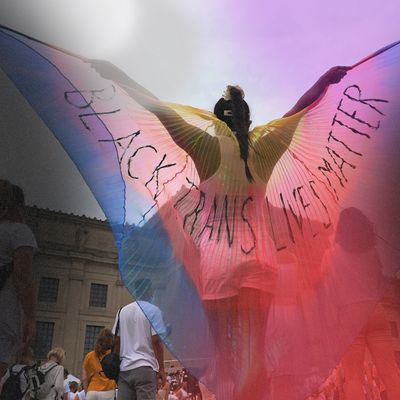
“Let today be the last day that you ever doubt Black trans power,” I cried into a microphone in the summer of 2020. I was addressing a crowd of nearly 15,000 people dressed in varying shades of white outside the Brooklyn Museum. Our uniform paid homage to a 1917 NAACP silent march for Black lynching victims. Now, more than a century later, we had gathered to honor the Black transgender people murdered during the coronavirus pandemic and before it. We chanted the often overlooked names of folks like Layleen Polanco, Tony McDade, Nina Pop, Dominique “Rem’mie” Fells, and Riah Milton. We imagined a world where Black trans people didn’t have to fight so hard to exist.
The Black Trans Lives Matter rally sprang from the unrest that followed the murder of George Floyd, but the movement is anything but new. Since the emergence of BLM, trans organizers had been building a national network to combat discrimination and violence in our communities. A month after a verdict was reached in the George Zimmerman case, New York activists mobilized around the killing of a Black trans woman named Islan Nettles on the streets of Harlem. You can find work like this happening in every corner of the country — groups like the New Orleans–based House of Tulip, a collective committed to finding long-term housing for those who need it, or Atlanta’s Solutions NOT Punishment Collaborative, which supports the political education of trans people. In the spirit of Sylvia Rivera and Marsha P. Johnson’s historic STAR House, the Knights & Orchids Society in Selma, Alabama, takes a holistic approach, helping Black trans and queer people access food and gender-affirming health care, among other basic human needs.
The past few years have been complicated. I’ve never felt more connected to the Black trans community and more disconnected from the wider population, which so often ignores our struggles. With each passing year, we reach record new highs of murders in our communities. But we continue to fight. And that day in the summer of 2020 will forever serve as a bridge between the rich history of the Black trans movement and a more liberated future.

